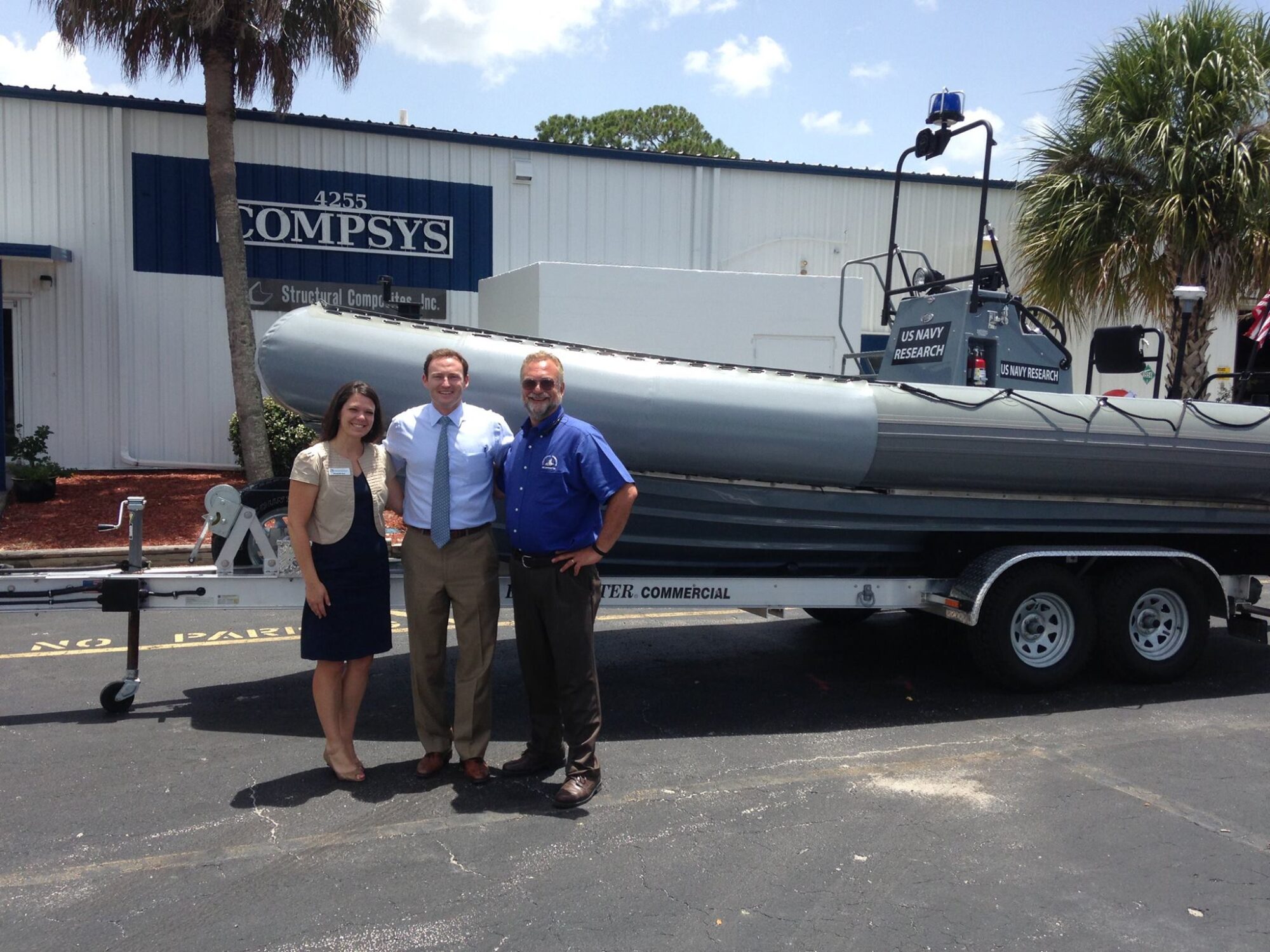Wayne T. Price
FLORIDA TODAY- Published July 11, 2015
MELBOURNE – Scott Lewit is looking for some friends in high places.
He needs them as tries to poke through the fortress known as the Environmental Protection Agency and get a little regulatory relief. At the least he’d like a fair hearing.

Lewit, founder and president of Compsys Inc. — a manufacturer of composite products that use a patented substance called Prisma — already has U.S. Rep. Bill Posey, R-Rockledge, on his side.
And to keep things bi-partisan, Lewit earlier this month gave a personal tour of his manufacturing on Dow Road in Melbourne to U.S. Rep. Patrick Murphy, D-Jupiter.
Murphy, by the way, is the leading Democrat contending for the U.S. Senate seat to be vacated by GOP presidential candidate Marco Rubio.
Lewit is no fly-by-night entrepreneur. A graduate of the Florida Institute of Technology, he has been in the research and manufacturing game for a couple decades in Brevard County. The U.S. Navy picked up on one of his designs, building a prototype of a utility boat that is 40 percent lighter, more fuel-efficient and less likely to injure its crew when it crashes into waves.
And Lewit also is a notable figure with the National Marine Manufacturing Association.
To understand Lewit’s position with the EPA, you have to put on your science hat for a moment.
To produce Prisma coating, Compsys needs a refrigerant and blowing agent called 134a. The EPA, in one of its attempts to reduce greenhouse gasses, last year placed limits on 134a because of the carbon dioxide equivalents it contains.
“So (the EPA) takes a very simple view and says if eliminate 134a with materials that have lower greenhouse gas, we help the environment, period end of story,” Lewit said. “Simple, but incorrect.”

“For Compsys and Prisma, we depend on 134a to produce Prisma. We have no reasonable alternative at this time,” Lewit said. “Also significant is, we save so much weight and make products last so much longer and are more efficient we can show that we save on greenhouse gasses through less materials used, better fuel efficiency etc. Add to all this, the 134a in our foam is encapsulated in composite so it cannot escape.”
Lewit says the National Marine Manufacturing Association, as well as the American Composites Manufacturers Association — and some members of Congress — have been trying to get the EPA to understand the difference between “non-recurring pollution and recurring pollution with regard to our product” for some time.
Lewit also offers this example:
“In 1996 we did a Sea Ray boat that won an award. It had a 50 percent lighter hull that allowed them to use a V-6 engine versus a V-8,” Lewit said. “This reduced the cost of the boat, reduced the fuel it needs, reduced the weight and cost of the trailer and allowed a smaller less costly tow vehicle, which would get better gas mileage.
“Without Prisma the boat would have cost more to purchase, more to run, more to tow and it all would have made more greenhouse gasses.”
For reference using one gallon of fuel creates 22.39 pounds of carbon dioxide, so making a lighter more efficient product uses less fuel and thus creates less pollution, Lewit said. He presented his findings to the EPA and essentially got nowhere.
“I talk to them,” Lewit said, “but they will not talk back to me.”
That’s where guys like Posey and Murphy hopefully can, and will, step up. Lewit understands and appreciates the EPA’s mission. But it is a powerful bureaucracy that can make things rough for business operators, large and small.
Lewit, who also has the U.S. Small Business Administration helping with his case, desperately needs to get the EPA folks to understand that a one-size-fits-all policy painfully burdens small manufacturers and muzzles growth and jobs.
Murphy, an advocate of repairing the ecological damage on the Indian River and Florida Everglades, was sympathetic.
“The bureaucracy in Washington is stifling growth in many areas,” said Murphy, who earlier in the year while on a tour of the Everglades with President Obama presented the president with a jar of muck from the Indian River to illustrate the need to focus more efforts on the waterway’s recovery.
“Oftentimes people get in this conversation of too much regulation, or not enough,” Murphy added. “To me it’s smarter regulation. It’s addressing the key issues at hand and not painting it as a one size fits all.”
From his lips to the EPA’s ears.
Price is business editor at FLORIDA TODAY. He can be reached at 321-242-3658 or wprice@floridatoday.com. You can also follow him on Twitter @Fla2dayBiz.

